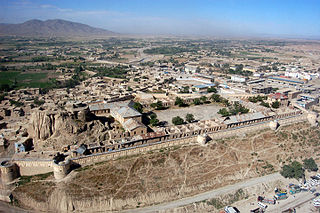
Paktia is one of the 34 provinces of Afghanistan, located in the east of the country. Forming part of the larger Loya Paktia region, Paktia Province is divided into 15 districts and has a population of roughly 623,000, which is mostly a tribal society living in rural areas. Pashtuns make up the majority of the population and a small percentage include Tajiks. Gardez is the provincial capital. The traditional food in Paktia is known as (dandakai) which is made from rice and mung bean or green gram.

Paktika is one of the 34 provinces of Afghanistan, located in the eastern part of the country. Forming part of the larger Loya Paktia region, Paktika has a population of about 789,000, mostly ethnic Pashtuns. The town of Sharana serves as the provincial capital, while the most populous city is Urgun.
The Kharoti (Pashto:خروٹی) خروټی) are a Pashtun tribe of Ghilji origin, originating in the central part of Paktika Province, Afghanistan, but can be also found in other parts of the country. The Kharoti settled in Kharotabad in Quetta, British India around 1945.
Nawa is a large district in the far south of Ghazni Province, Afghanistan. It is 100 km south from Ghazni in a mountainous region. The salt lake Ab-i Istada is located in the northern part of the district. Nawa's population was estimated at 29,054 in 2002, of whom around 45% were children under 12. The district center is the village of Nawa. Military operations in the district were featured in articles in the Washington Post and the New York Times in October 2009. The district was controlled by the Taliban until 17 July 2017.

Operation Mountain Fury was a NATO-led operation begun on September 16, 2006 as a follow-up operation to Operation Medusa, to clear Taliban insurgents from the eastern provinces of Afghanistan. Another focus of the operation was to enable reconstruction projects such as schools, health-care facilities, and courthouses to take place in the targeted provinces.

Sharana is the capital of Paktika Province, Afghanistan. It is located at an altitude of 2,200 meters. Its population was estimated to be 2,200 in 2006. The city of Sharana has a population of 15,651 and is located within the heartland of the Sulaimankhel tribe of Ghilji Pashtuns. It has 6 districts and a total land area of 5,893 hectares. The total number of dwellings in this city are 1,739.

Sharana District or Sharan District is home to the city of Sharana, which is the capital of Paktika Province, Afghanistan. The Paktika Governor's compound is in Sharana, attached to the police headquarters for the province. The district is within the heartland of the Sulaimankhel tribe of Ghilji Pashtuns. The estimated population in 2019 was 63,626.

Sari-roza or Sar Hawza is a district of Paktika Province, Afghanistan.

Khairkot District, also known as Katawaz (کټواز) or Zarghun Shar District, is a district of Paktika Province, Afghanistan. The district is within the heartland of the Sulaimankhel tribe of Ghilji Pashtuns. The district capital is Khairkot town.

Zerok District, also spelled Zirok, is a district of Paktika Province that once was a part of Paktia, Afghanistan. The main town is Zerok located on the main Khost-Urgun road.

Mohammad Gulab Mangal is an Afghan politician. Since October 2016, he has been serving as the senior adviser minister of borders and tribal affairs for the president of the Islamic Republic of Afghanistan. He is also actively involved in the tribal conflict resolutions. On 23 October 2016, he was appointed as the senior adviser for the minister of borders, tribal affairs, and provincial governor of Nangarhar province until he resigned in April 2018. From 22 April 2015 to 23 October 2016, based on the presidential decree, he was appointed as the acting minister of Ministry of Borders and Tribal Affairs. In 2002, he was elected as the Representative of Paktia Province for Emergency Loya Jirga. From 2002 to 2004, he was the Head of Constitution office for the south east region(Paktia, Paktika, Khost and Ghazni provinces and also Head of Constitution Loya Jirga election office for the South East Region. From 2004 to 2006, he served as Governor of Paktika province. From 2006 to 2008, he served as the Governor of Laghman province. From March 2008 to September 2012, he served as provincial governor of Helmand province.

Arsala Jamal was an Afghan government official, who served as governor of the provinces of Khost and Logar in Afghanistan. He was assassinated in a bomb attack in Logar province of Afghanistan on 15 October 2013.

Mohibullah Samim is a politician with a diverse background. He holds a master’s degree in International Relations, complementing his bachelor’s degree in linguistics. Before the Taliban takeover in Kabul, Afghanistan, he served as the Minister of Borders and Tribal Affairs. On 20 April 2010, he assumed the role of Governor of Paktika.
The Sulaimankhel, or Suleiman Khel, are a Pashtun sub-tribe of the Khilji tribe. As they are primarily Nomadic People. In the early 20th century, the tribe was recognized as generally pastoral.
2003 in Afghanistan. A list of notable incidents in Afghanistan during 2003
Ehsanullah Ehsan is a former spokesman of Tehreek-e-Taliban Pakistan (TTP) and later Jamaat-ul-Ahrar. As a spokesperson of the groups, Ehsan would use media campaigns, social media networks and call up local journalists to claim responsibility for terrorist attacks on behalf of the groups. He was initially a spokesman for the Tehreek-e-Taliban Pakistan (TTP). In 2014, he left TTP after he had developed ideological differences with the TTP leadership following the appointment of Fazlullah as the leader of the group. He later co-founded Jamaat-ul-Ahrar and became its spokesman. In 2015, as a spokesman of Jamaat-ul-Ahrar, he condemned Fazlullah-led Tehrik-e-Taliban attack on a school in Peshawar.

Sushmita Banerjee, also known as Sushmita Bandhopadhyay and Sayeda Kamala, was a writer and activist from India. Her works include the memoir Kabuliwalar Bangali Bou based on her experience of marrying an Afghan and her time in Afghanistan during Taliban rule. The story was used as the basis for the Bollywood film Escape from Taliban. She was murdered at age 50 by suspected Taliban jihadists during the evening of 4 September or in the early morning hours of 5 September 2013, outside her home in Paktika Province, Afghanistan.
Abdul Karim Matin is an ethnic Pashtun politician who served as the governor of Paktika Province from 2014 to 2015, and of Ghazni since 2016. Matin went to Gazi High School and studied at Kabul University. He was a Ministry of Rural Rehabilitation and Development official for Urban Rainwater Harvesting and the Regional Coordinator for Southern Region of Afghanistan. In 2015, Mateen has escaped unharmed from an armed attack from Taliban when he was visiting security check posts in the outskirts of Sharana.
Maulvi Abdullah Mukhtar is an Afghan Taliban politician who is currently serving as Governor of Paktika Province since 7 November 2021.











